THE INDIAN EXPRESS NEWSPAPER

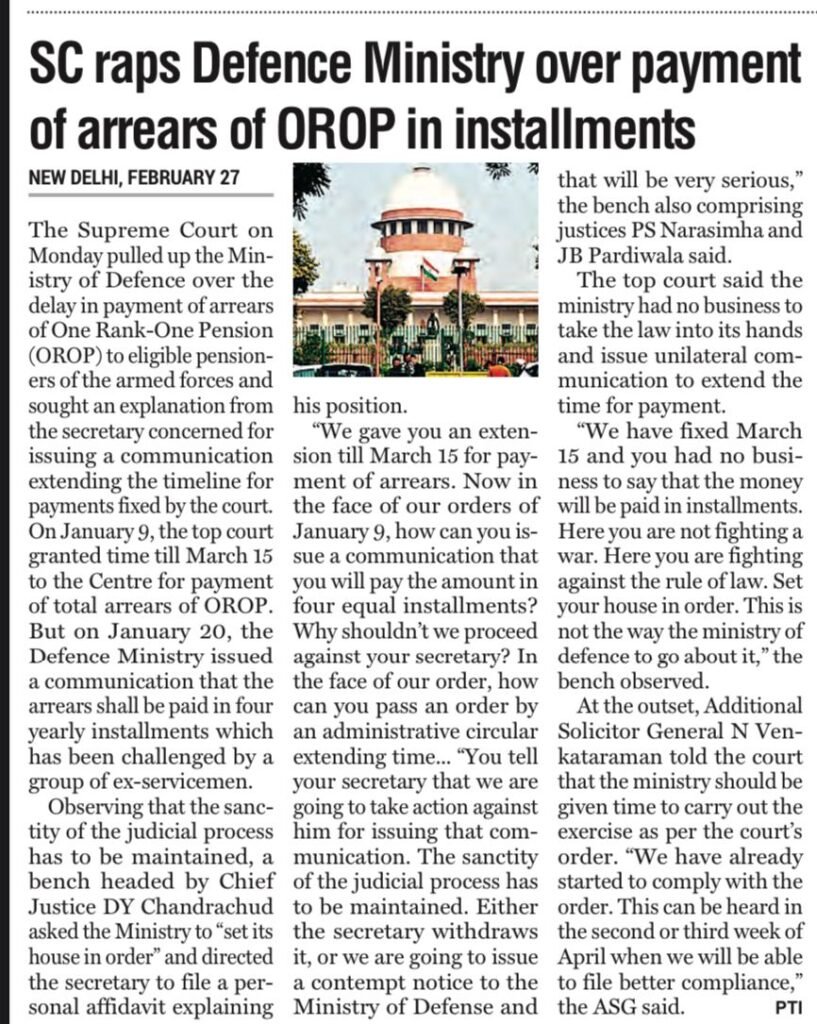













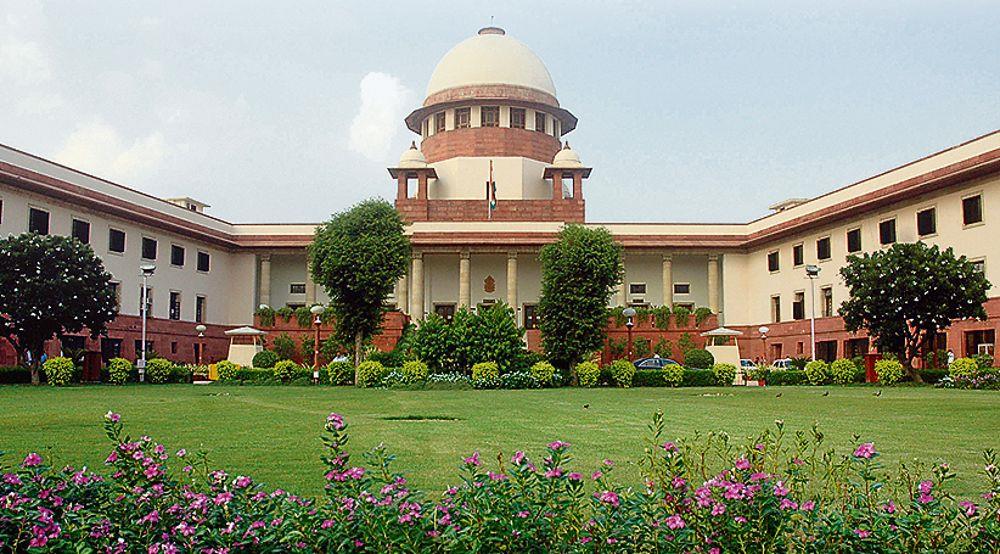
Photo used for representational purpose only. File Photo
New Delhi, February 27
The Supreme Court on Monday came down heavily on the Ministry of Defence over its January 20 communication regarding payment of arrears of One Rank-One Pension (OROP) in installments to eligible pensioners of the armed forces.
A bench headed by Chief Justice DY Chandrachud took exception to the letter issued by the secretary in the ministry, and directed him to file a personal affidavit explaining his position.
“You tell the secretary we are going to take action against him for that January 20 communication. Either withdraw it, or we are going to issue a contempt notice to the Ministry of Defense. Sanctity of the judicial process has to be maintained,” the bench also comprising Justices PS Narasimha and JB Pardiwala said.
Additional Solicitor General N Venkataraman told the court that the Ministry should be given time to carry out the exercise as per the court’s order.
The apex court posted the matter after Holi vacation.
On January 9, the top court had granted time till March 15 to the Centre for payment of total arrears of OROP to all eligible pensioners of the armed forces.
Last month, the government has moved the top court seeking extension of time till March 15, 2023 for payment of arrears of OROP scheme to all eligible pensioners of the armed forces.
This is the second extension given by the top court to the Union government to pay the arrears after it had first moved the top court in June, last year and sought three months to compute and make payments in accordance with the March 16, 2022 verdict of the top court.
The top court’s 2022 verdict came on the plea filed by the Indian Ex-servicemen Movement (IESM) through advocate Balaji Srinivasan against the Centre’s formula.
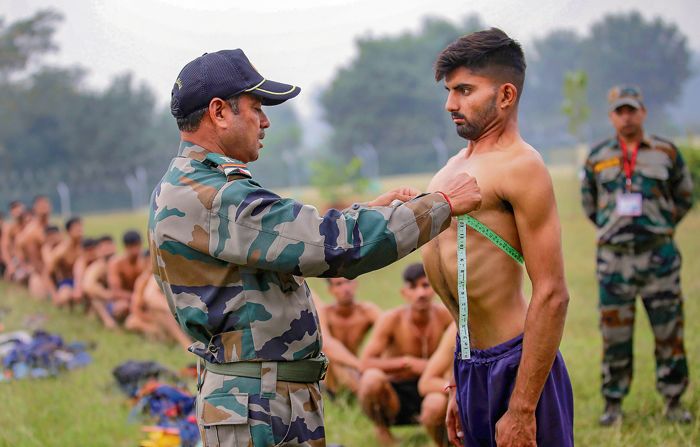
The Delhi High Court on Monday dismissed petitions challenging the Centre’s Agnipath scheme for recruitment in the armed forces, saying “it is formulated in the national interest to ensure that the forces are better equipped”.
“This court finds that the petitioners have no vested right to claim that the recruitment under the 2019 notification and CEE (Combined Entrance Examination) needs to be completed,” said a Bench led by Chief Justice Satish Chandra Sharma and Justice Subramonium Prasad.
The Bench, which had reserved its verdict on the petitions on December 15, 2022, said, “The petitioners have no vested right to seek such recruitment, and secondly, that promissory estoppel and legitimate expectation find themselves severely restricted by the overarching concerns of public interest.”
The Bench also rejected the petitioners’ contention that those who took part in the regular recruitment process should be placed on a par with individuals who were recruited through rallies, saying the argument did not hold water.
Under the Agnipath scheme announced in June last year, youth aged between 17-and-a-half and 21 years would be inducted into the armed forces for four years and 25 per cent of them would be retained for 15 more years. Later, the government extended the upper age limit for recruitment to 23 years.
Court No.1 Item No.17
INDIAN EX SERVICEMEN MOVEMENT (AN ALL INDIA FEDERATION OF MILITARY VETERANS ORGANISATION REPRESENTED BY ITS GENERAL SECRETARY) BALAJI SRINIVASAN
Versus
UNION OF INDIA DEPARTMENT OF EXSERVICEMEN WELFARE MINISTRY OF DEFENCE SECRETARY
Draft Order
By the judgment of this Court dated 16.03.2022, the pension which were required to be paid in pursuance of the One Rank One Pension (OROP) were directed to be paid within a period of three months to all pensioners. The relevant para of the above judgment is extracted below. Thereafter, on the application filed by the Union Ministry of Defence a further extension of time of three months was granted by an order dated 16.09.2022. By an order dated 09.01.2023, a further extension of three months has been granted. In the meantime, a communication has been issued by the Department of Ex-Servicemen Welfare Organisation in the Union Ministry of Defence on 23.01.2023. The paragraph 6 of the communication states as follows:
Page 100 Annexure 7
The paragraph 76 which has been extracted above, which seeks to defer implementation in four half-yearly instalment is contrary to the order of this Court by which time has been extended until 15.03.2023.
We direct the concerned Secretary in the Union Ministry of Defence entrusted with the duty of overseeing the Department of Ex-servicemen Welfare Organisation to file a personal affidavit explaining circumstances in which such a unilateral decision to extend time for payment was made in spite of clear directions of this Court. We are issuing these directions in order to furnish an opportunity to the Union Government to comply with the binding directions of this Court’s order dated 09.01.2023.
List after Holi holidays.
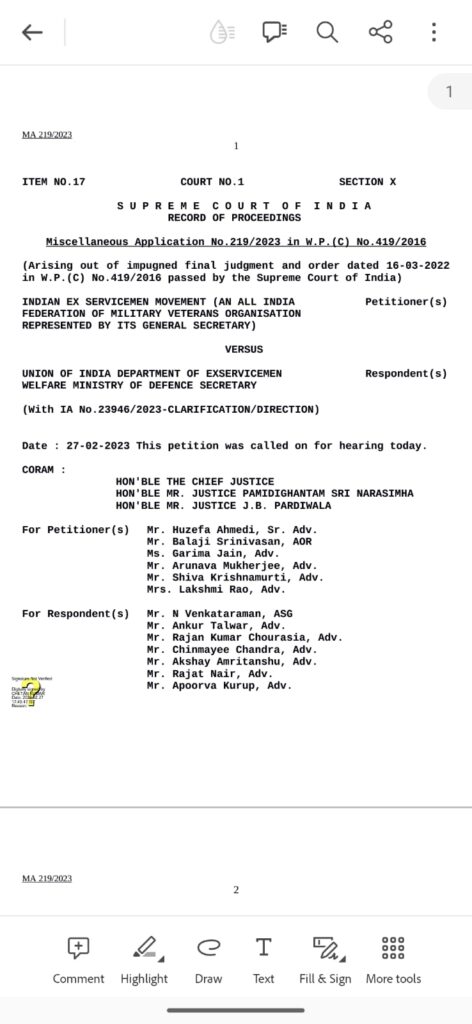
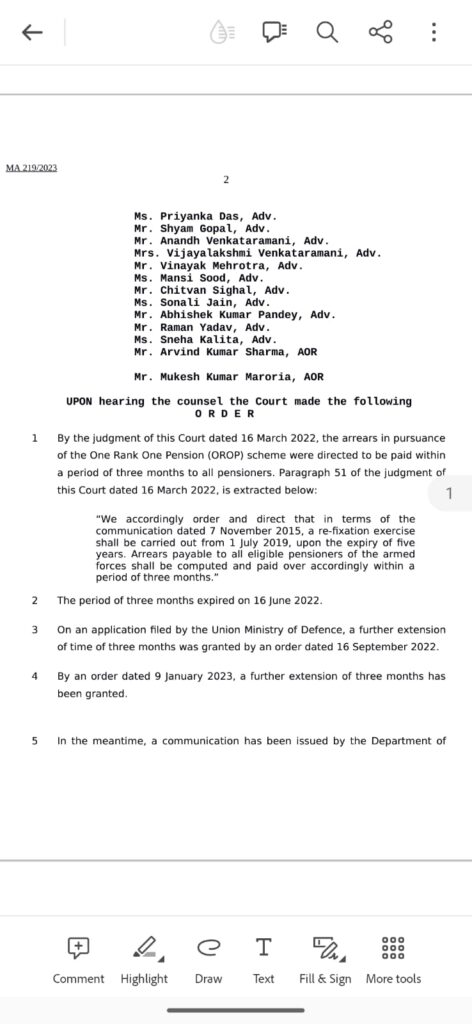
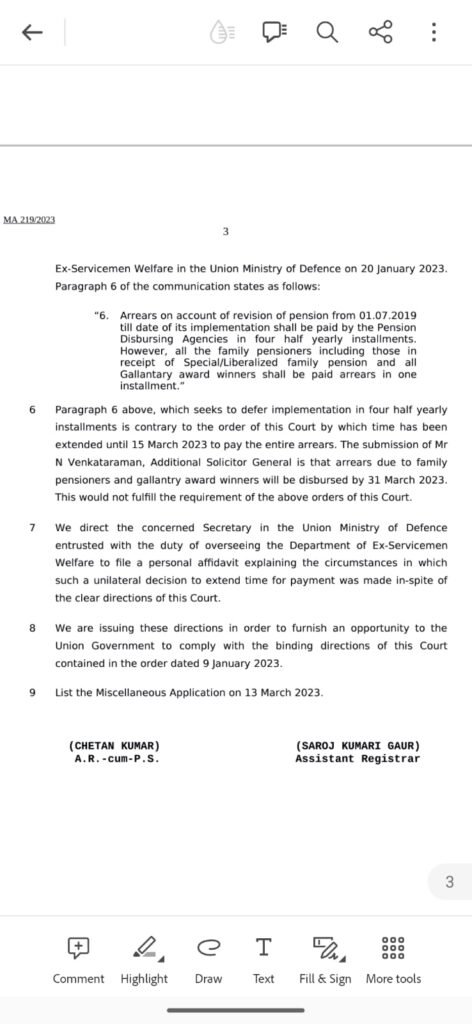
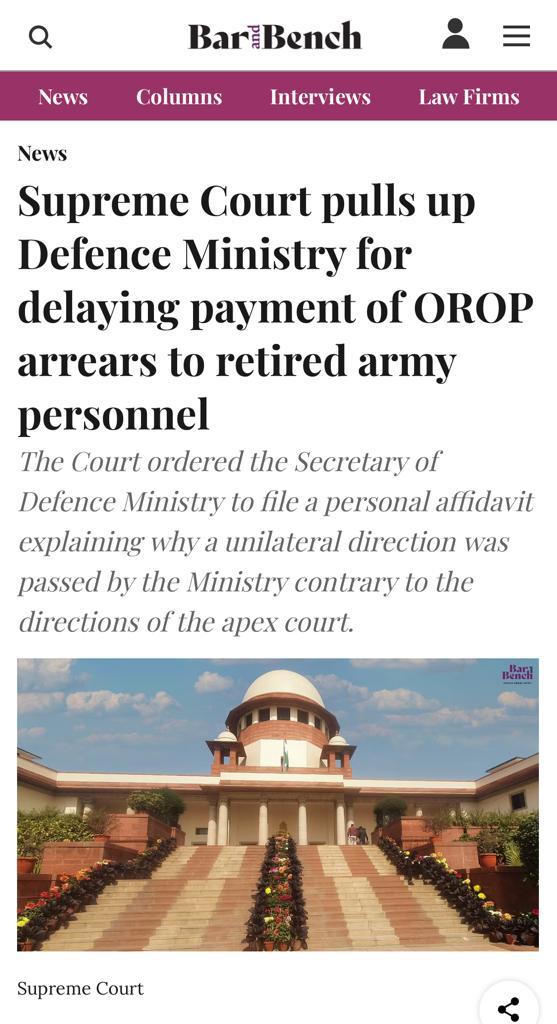
New York, February 26
The passcode in iPhones that helps people unlock their devices is now giving thieves easy access to steal their money and data at public places.
According to Wall Street Journal, using a remarkably low-tech trick, thieves watch iPhone owners tap their passcodes, then steal their targets’ phones and their digital lives.
A 31-year-old senior economist at a workforce intelligence startup lost all photos, contacts and notes in her iPhone 13 Pro Max which was snatched at a bar in Midtown Manhattan and about $10,000 vanished from her bank account in just 24 hours.
“With only the iPhone and its passcode, an interloper can within seconds change the password associated with the iPhone owner’s Apple ID,” said the report.
This would lock the victim out of their account, which includes anything stored in iCloud.
“The thief can also often loot the phone’s financial apps since the passcode can unlock access to all the device’s stored passwords,” it added.
When the password change is complete, the software offers an option to force other Apple devices, such as Macs or iPads, to sign out of the Apple account, so a victim couldn’t turn to those devices to regain access.
The Apple software never requires the user to enter an older password before setting a new one.
With the new password, the thief can disable Find My iPhone. Disabling Find My iPhone feature also allows the thief to resell the iPhone.
As Apple spokesperson said that iPhone is the most secure consumer mobile device, and “we work tirelessly every day to protect all our users from new and emerging threats”.
“We sympathise with users who have had this experience and we take all attacks on our users very seriously, no matter how rare,” the spokesperson was quoted as saying.
“We will continue to advance the protections to help keep user accounts secure.” Nearly all of the victims had their iPhones stolen while they were out at night socialising at public places, pubs and bars.
In all cases, the iPhone owners were locked out of their Apple accounts.
“They then discovered thousands of dollars in financial thefts, including some combination of Apple Pay charges, drained bank accounts linked to phone apps and money taken from PayPal’s Venmo and other money-sending apps,” the report elaborated.
The same vulnerability is there in Google’s Android mobile operating system but the “higher resale value of iPhones makes them a far more common target”, according to law enforcement officials.
“Our sign-in and account-recovery policies try to strike a balance between allowing legitimate users to retain access to their accounts in real-world scenarios and keeping the bad actors out,” a Google spokesperson was quoted as saying.
Apple recently introduced the ability to use hardware security keys, little USB dongles, to protect the Apple ID.
Russian military helicopter flies near a church in Donetsk. REUTERS
https://cdn.vuukle.com/widgets/audio.html?version=1.0.5
Advertisement
Kyiv, February 27
China said on Monday it sought dialogue and a peaceful solution for Ukraine despite US warnings that Beijing might be considering weapons supplies for its ally Russia’s invasion.
China’s Foreign Ministry said it had kept contact with all sides in the crisis including Kyiv and its position was clear. “The core is to call for peace and promote dialogue and promote a political solution to the crisis,” Foreign Ministry spokeswoman Mao Ning said in a statement at a news briefing in Beijing.
Will come at real cost to beijing
This war presents real complications for Beijing. It will have to decide whether it provides military aid to Russia. But, if it goes down that road, it will come at real costs to China. —Jake Sullivan, US National Security Adviser
“From our perspective, actually, this war presents real complications for Beijing. And Beijing will have to make its own decisions about how it proceeds, whether it provides military assistance. But, if it goes down that road, it will come at real costs to China. And I think China’s leaders are weighing that as they make their decisions,” Sullivan told CNN.
Sullivan said that the US is “not just making direct threats. We’re just laying out both the stakes and the consequences, how things would unfold. And we are doing that clearly and specifically behind closed doors.” According to CNN, Sullivan’s comments come at a critical point in the Ukraine war. The US has intelligence that the Chinese government is considering providing Russia with drones and ammunition for use in the war, three sources familiar with the intelligence told CNN.
China, which declared a “no limits” alliance with Russia shortly before the invasion a year ago, has refused to condemn the onslaught and last week published a 12-point plan calling for a ceasefire and gradual de-escalation by both sides.
Kremlin spokesman Dmitry Peskov said on Monday the Chinese plan should be analysed in detail and account for the interests of all sides, but for now Moscow saw no signs suggesting a peaceful resolution was feasible. “We are paying a great deal of attention to the plan of our Chinese friends… This is a very long and intense process,” Peskov said.
Moscow’s forces are incurring high losses in trench warfare as they struggle to make further gains in eastern Ukraine while Kyiv eyes a counter-offensive with advanced Western weapons, including battle tanks, pledged over the coming months.
Casting the Ukraine war as a battle for Russia’s survival against a rapacious West, Russian President Vladimir Putin last week hailed “new frontiers” in ties with Beijing and indicated that his Chinese counterpart Xi Jinping would soon visit Moscow. — Agencies
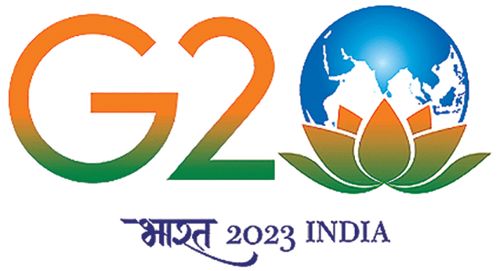
he Ukraine issue will be the centre of attention when Foreign Ministers of G20 countries begin gathering in the Capital from Tuesday for the G20 Ministerial on March 1 and 2.
https://cdn.vuukle.com/widgets/audio.html?version=1.0.5
Advertisement
Sandeep Dikshit
New Delhi, February 27
The Ukraine issue will be the centre of attention when Foreign Ministers of G20 countries begin gathering in the Capital from Tuesday for the G20 Ministerial on March 1 and 2.
If the just-concluded Finance Ministers’ meeting is any indication, the battle by the West to put Russia on the mat will be even fiercer.
As yet there is no indication whether India will acquiesce to Ukrainian Foreign Minister Dmitry Kuleba addressing the gathering via a video link. Ukrainian Finance Minister Serhiy Marchenko did not address the G20 meeting of Finance Ministers held in Bengaluru on February 24 and 25.
Amid a battle between the West on one side and Russia and China on the other, India will be hoping to play a key role it had performed at the G20 summit in Indonesia in November last year.
India had adopted the same mediatory role at the Bengaluru meeting where the portion on Ukraine in the “Outcome Document” stated that G20 was not the forum to resolve security issues, but added that “security issues can have significant consequences for the global economy”.
The rest of the portion on Ukraine mentioned in the Bengaluru Ministerial was a virtual replication of the language contained in the G20 Indonesia summit. India recognises that the West may press for stronger formulation at the forthcoming Delhi G20 Ministerial and has its task cut out in balancing the views of both protagonists in the conflict.
The West is likely to mount pressure till the summit on September 9 and 10, when it is likely to insist on the presence of Ukrainian President Volodymyr Zelenskyy.
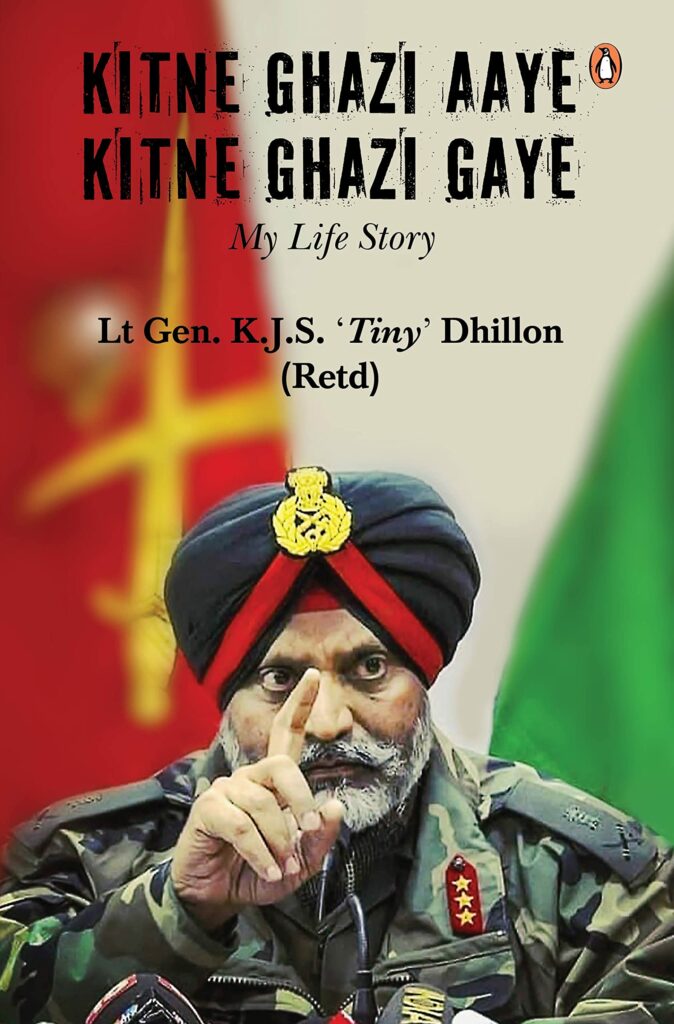
“Shed not recklessly the blood of another with thy sword, Lest the Sword on High falls upon thy neck.”
Guru Gobind Singh Ji’s ‘Zafarnama‘
When I finished reading the autobiography of Lt Gen KJS ‘Tiny’ Dhillon, it felt like a script written by Quentin Tarantino who is famous for using non-linear narrative as a tool to introduce his characters multiple times, through different characters’ perspectives, in all timelines.
When I was living in Auckland, New Zealand, I would visit the local Gurudwara on Sundays to listen to the Guru ki Bani and enjoy the “Langar Prasad”. Though I heard this sermon over ten years ago, it remained with me when the Granthi said that Guru Nanak Dev Ji once said, “Whoever has come, shall depart; all shall have their turn”. He later, perhaps using his own interpretation and wisdom said, maybe we should stop worrying about death and focus more on how one shall depart, with either honour or ignominy.
The book “Kitne Ghazi Aaye Kitne Ghazi Gaye” is not just about how Lt Gen Tiny Dhillon tackled terrorism in Kashmir and his handling of the Pulwama terror attack or how he kept peace after the abrogation of Article 370 and Article 35(a). It is in fact the story of how one overcomes personal losses, endures the pain of losing his loved ones at a very young age, learns from mistakes, and more importantly has empathy for his fellow man.
We all know Gen Dhillon to be an imposing figure, yet while reading this book I never got the impression that he ever used his god-given physical strength to bully anyone or allowed to be bullied. It is quite possible as a learned man he may have come across one of the teachings of Guru Govind Singh Ji Maharaj who said, “If you are strong, torture, not the weak” and therefore used his strength only to defend the weak.
The other aspect I found endearing was there is no grandstanding or self-aggrandizement by the author and as they say in sports, there is no ‘I’ in a team. In fact, he talks more about others who inspired, influenced, and shaped his character from childhood to adulthood showcasing his humility.
Pulwama, Balakot and the Abrogation of Articles 370 and 35 (a)
“Agar itihas likhna hai toh kisi ko itihas bananna padega“! When Gen Dhillon was going through the rigours of National Defense Acadamy (NDA) he broke his right index finger which later became crooked and that perhaps made him an unconventional thinker and a problem solver. As he writes in his book “Ghee seedhi ungli se na nikle, toh ungli tedi karni padti hai. Means, straightforwardness should be applied only to those who are straight but a crooked attitude is needed to deal with the crooked“.
Without going into details and to ensure there is no spoiler alert on my part, how Gen Dhillon handled the aftermath of the Pulwama jihadi suicide attack that led to the death of 40 CRPF jawans, the retaliatory Balkot airstrikes inside Pakistan, and the subsequent abrogation of Article 370 can be a book in itself. As he was privy to the knowledge of the impending abrogation of article 370, Gen Dhillon ran an exercise wherein he fully stocked the rations for the forward areas due to possible disruption again showcasing his out-of-the-box contingency planning.
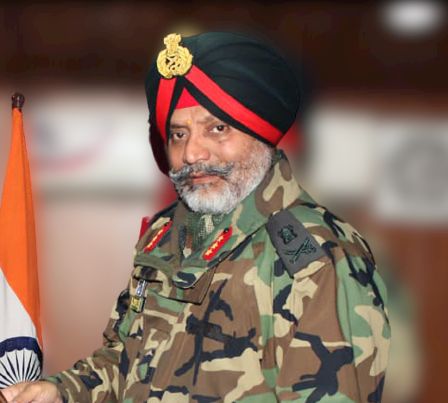
Loss of his Shermaar Maa
Without going into too many details, Gen Dhillon lost his mother when he was three years old to a very strange and macabre accident. In Nepal, she and her husband were attacked by a wild animal injuring both of them severely. However, gathering all her strength she wrung the beast’s neck until it died. This story reminded me of the great Hari Singh Nalwa, one of the bravest generals of Maharaja Ranjeet Singh who once killed a tiger with his bare hands and maybe she was one of his descendants.
In his book, Gen Dhillon writes that the main motivation behind, “Operation Maa” was the vacuum he felt due to a lack of motherly affection growing up. However, operation maa was a success as he had managed to strike a chord with the mothers in the Kashmir valley whose sons were sinisterly misguided to become terrorists. He writes, “No mother should be without a child and no child should be without a mother and this proved to be a great deterring factor for young men to pick arms against the nation”.
Some honourable mentions from the book
This book is the most unusual autobiography I have ever read and it was not easy to review as there are too many stories and anecdotes but a few instances do standout that gives life lessons in professionalism, leadership, humility, compassion, sacrifice, commitment, and empathy:
In his long career in the Indian Army, Gen Dhillion lived by these three words – Imandari, Wafadari, and Zimmedari. The first example I can think of after reading the book is when he was declared dead twice, the second time when his wife was eight months pregnant! Therefore he created the proper channel of communication to avoid panic and anxiety for the family members of his jawans and officers.
The second example was the supreme importance he gave to the welfare of men under his command, particularly those who laid down their lives in the line of duty. He ensured proper due diligence was done when processing documents to ensure the family receives proper compensation and benefits without delay.
Epilogue
It is very rare when a book becomes a best-seller even before it is released but such has been the impact of Tiny Dhillon on the hearts and minds of the people. His real aim, however, is not just to tell his own story but to also motivate a new generation of youth who aspire to join the armed forces.
(The views expressed are the author’s own)
Book: Kitne Ghazi Aye Kitne Ghazi Gaye, My life Story
Author: Lt Gen KJS ‘Tiny’ Dhillon
Publishers: Penguin Random House
Price: ₹699 (Hardcover)
SW Ratings: ****

Balakot airstrike, “Operation Bandar” as it was code-named, was in retaliation for the Pulwama terrorist attack in India, which killed 40 Central Reserve Police Force (CRPF) soldiers on February 14, 2019
The Balakot airstrike, carried out by the Indian Air Force (IAF), marks its fourth anniversary on Sunday. It was a “punitive strike” on a Jaish-e-Mohammed (JeM) facility in Pakistan’s Khyber Pakhtunkhwa region conducted on February 26, 2019. “Operation Bandar,” as it was code-named, was in retaliation for the Pulwama terrorist attack in India, which killed 40 Central Reserve Police Force (CRPF) soldiers on February 14, 2019. The attack was by a vehicle-borne suicide bomber at Lethapora in the Pulwama district of erstwhile Jammu and Kashmir.
“Bandar mara gaya.”(The monkey has been killed.) was said in Hindi by the then Air Chief BS Dhanoa through a phone call to National Security Adviser Ajit Doval on a special RAX number at 3.45am on February 26, 2019. RAX is an ultra-secure fixed-line network. NSA Doval, in turn, informed Prime Minister Narendra Modi. Dhanoa also made similar calls to then defence minister Nirmala Sitharaman and secretary (Research and Analysis Wing) Anil Dhasmana.
The message meant that the Jaish-e-Mohammed (JeM) terrorist training camp at Balakot in Pakistan’s hinterland had been destroyed by Indian fighter jets in a daring pre-dawn cross-border operation.
Top officials and functionaries involved in the Balakot strike previously told HT that the code name “Bandar” was deliberately chosen to confuse Pakistani intelligence, which the Indian side hoped would think the reference was to the JeM HQ in Bhawalpur, where the terror group’s ailing chief Masood Azhar was safely housed.
Five Israeli-origin Spice-2000 bombs with penetrator warheads were dropped on three targets in Balakot by IAF’s Mirage-2000s, allowing them to pierce through the rooftops before exploding inside to cause maximum damage. The target camp was approximately 80 kilometres from the Line of Control (LoC).
Following the Pulwama attack, the two countries engaged in an aerial battle in which wing commander Abhinandan Varthaman, flying an upgraded MiG-21 Bison, fought and shot down one of Pakistan’s fighter jets before being hit and forced to eject. After nearly 60 hours in captivity, Pakistan returned him to India on March 1.

























































